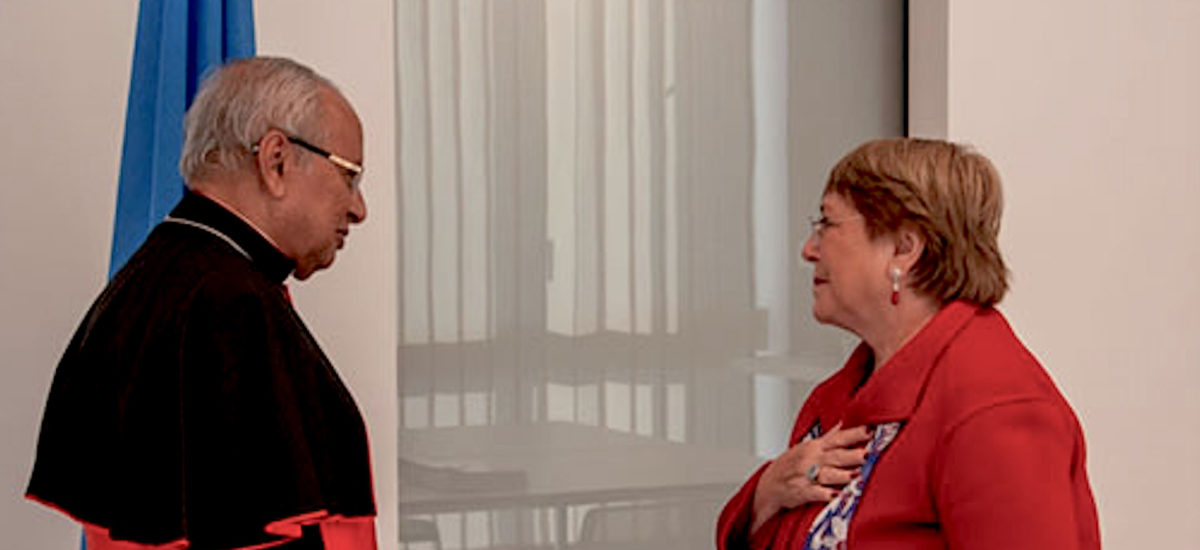Photo courtesy of Adaderana
The Sri Lankan government was never likely to find the scrutiny of the United Nations Human Rights Council (UNHRC) in March 2022 a comfortable experience. In a discussion delayed because of the Ukraine crisis, the grimness of the situation and failure to make substantial progress were laid bare. Amid persisting concerns about mistreatment of people and revelations about the Easter Sunday bombings, the regime’s credibility at home and abroad has worn thin. Targeted sanctions against individuals guilty of human rights violations were among the options to increase accountability.
Failure to guarantee justice and freedom
Before the 49th session of the UNHRC, the High Commissioner on Human Rights, Michelle Bachelet, reported on the lack of consistent progress and extent of evidence gathered. As the session began, Sri Lankans were struggling amid an economic crisis resulting largely from bad policy choices.
Before a previous crucial UNHRC session, in 2021, the government had announced an end to its policy of forcibly cremating the bodies of Muslims who had died of Covid-19. This had previously been enforced despite the fact that burial posed no public health risk. In March 2022, the government declared that Muslim families could organise the burial of loved ones who were Covid-19 victims rather than being buried on a remote island under military supervision. But it is questionable whether many UNHRC members were impressed by this pattern of inflicting pointless cruelty on grieving and vulnerable people, then removing this stipulation just before the situation in Sri Lanka was due to be discussed.
UN human rights experts criticised the weakness of proposed reforms to Prevention of Terrorism Act (PTA) warning that “There is a grave risk to the rights and liberties of people who may be detained arbitrarily, especially religious and ethnic minorities, and the use of the law may curtail political dissent with no effective due process guarantees.” They called for an immediate moratorium on PTA use until amendments had been made.
On March 4, an interactive dialogue on the Sri Lanka situation started. Dr. Bachelet presented her report, while Foreign Minister G.L. Peiris predictably claimed that there were serious weaknesses in her case.
Various others spoke, including Rita French from the UK on behalf of the core group, which had drawn up last year’s resolution. They shared concerns about “the continued lack of progress on accountability” and “setbacks in several emblematic human rights cases”, “surveillance and harassment of civil society” and increased marginalisation of minorities. While some defended the regime, there was clearly much concern.
The stance on terror
After a weekend break, the interactive dialogue resumed on March 7. As well as representatives of member states, there were statements from NGOs such as Amnesty International on shrinking civic space, obstacles faced by families of those disappeared, the targeting of Muslims and the continued use of the much-criticised PTA.
But perhaps the most newsworthy plea for justice was that of Cardinal Malcolm Ranjith, head of the Catholic church. He called on the UN to investigate the 2019 Easter Sunday bombings that killed numerous people. “The first impression of this massacre was that it was purely the work of a few Islamic extremists,” he said. “However, subsequent investigations indicate that this massacre was part of a grand political plot.” He also criticised attempts by the government “to harass and intimidate those who clamour for justice.”
The terror attacks had helped to propel President Gotabaya Rajapaksa to power, as many members of the Sinhalese majority voted for a hard line military man whom they hoped would ensure their security. Yet questions grew about why the new president’s allies in government had previously repeatedly refused to act on warnings about those who masterminded the blasts.
Allegations had surfaced that, at a time when he had been defence secretary, bomber Zahran Hashim had been on the state payroll, as had Bodu Bala Sena, an extremist organisation that distorts Buddhism for its own purposes. While at first this seemed too shocking to believe, evidence has mounted about military intelligence links to the Easter Sunday attackers, including recent claims. If true, the arbitrary arrest and detention of Muslims with no connection to the violence is cynical as well as cruel. Meanwhile the survivors and bereaved have been left to wonder what happened. It was against this background that the Cardinal addressed the UNHRC.
In concluding remarks, Nada Al-Nashif, Deputy High Commissioner for Human Rights said the High Commissioner, suggested that “Reports had already elaborated a menu of options that could be pursued with regard to accountability, including at the international level. One option included applying targeted sanctions to individuals who were reliably recognised to have been guilty of human rights violations. Sanctions were important and could lead to a sense of justice for the families. The international community should encourage Sri Lankan civil society to build institutions.”
She expressed “concern for the intrusion of more extremist brands of religious and nationalist discourse in the country – it was important to encourage social cohesion and peace building with the aim of ending intolerance”. The UN reported that she commented that “The commitment by the Government to the Sustainable Development Goals agenda was recognised. Strengthening the independence of the judiciary, among other things, would help to accede to these. The 2030 Agenda put forward an inclusive vision in which there was no place for rhetoric or hate speech in regard to minorities.”
It would appear that there is growing impatience, globally as well as in Sri Lanka, with rhetoric and small advances alongside reversals. Pressure will almost certainly continue to increase.


